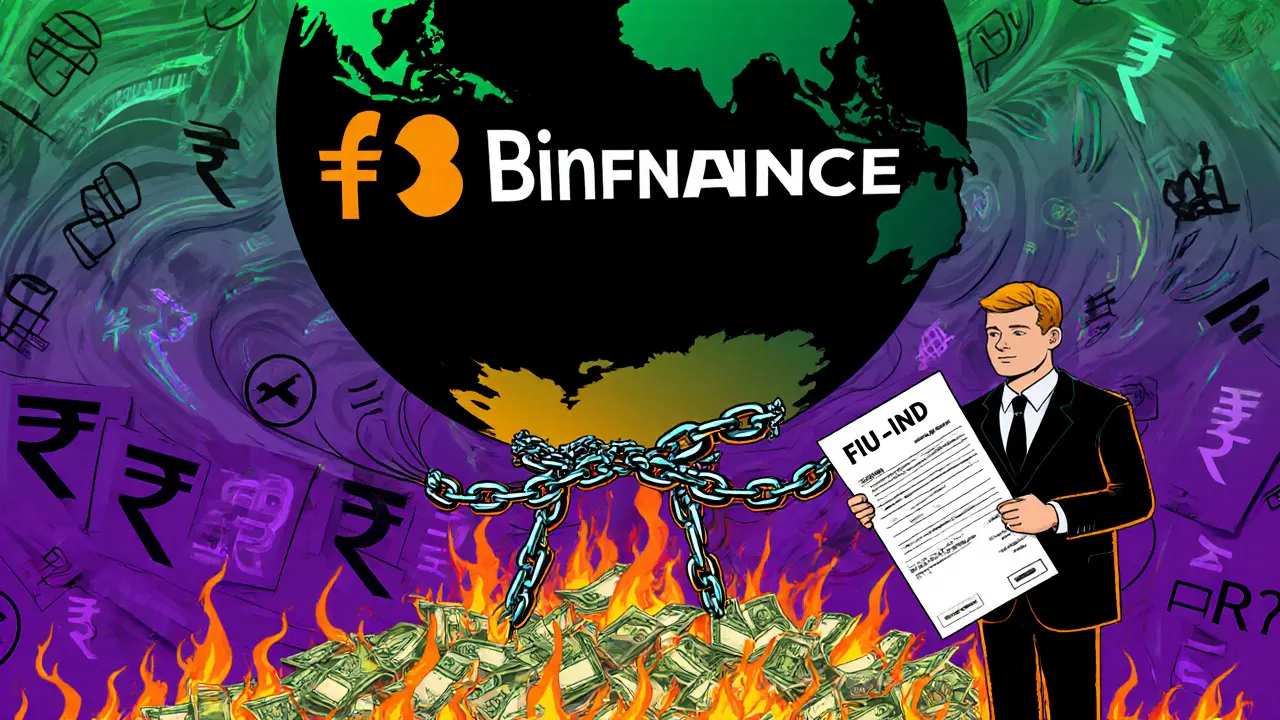Crypto Exchanges to Avoid if You Are Indian in 2025
If you're trading crypto in India, picking the wrong exchange isn't just a bad choice-it could cost you your money, your time, and even land you in legal trouble. The rules aren't always clear, but the risks are. And some exchanges are actively making things worse for Indian users.
Why Some Exchanges Are Dangerous for Indians
India doesn't ban crypto trading, but it doesn't protect you either. The Financial Intelligence Unit of India (FIU-IND) sets the ground rules for crypto platforms, and if an exchange ignores them, you're on your own. No insurance. No legal recourse. No help from banks or authorities if things go wrong. Many international exchanges don't bother getting FIU-compliant. They treat India like any other market-until the penalties hit. And when they do, Indian users are the ones stuck holding the bag.WazirX: The Giant That Crumbled
WazirX was India’s biggest homegrown exchange. Over 6 million users. $5.4 billion in monthly trades. Backed by Binance and the Blockchain India Fund. It looked safe. Then, in July 2024, it got hacked. A multi-signature wallet was breached. $230 million vanished. Not a small amount. Not a glitch. A total collapse of security. Instead of returning funds, WazirX announced a "restructuring." Months later, users still can’t access their money. Customer support is silent. The platform still lists 250+ cryptocurrencies and charges trading fees between 0.10% and 0.40%, but none of that matters if your coins are locked away forever. If you’re still using WazirX, you’re not trading crypto-you’re gambling with your savings.Binance: Penalized, Not Protected
Binance is the world’s largest crypto exchange. But in India, it’s a problem child. The FIU-IND slapped Binance with millions in penalties for failing to report user data, implement KYC properly, and comply with anti-money laundering rules. That’s not a warning. That’s a red flag. If the regulator is fining them, they’re not playing by India’s rules. And when things go sideways-like a hack, a freeze, or a withdrawal delay-you won’t get help from Indian courts. Binance’s support team won’t even acknowledge your ticket if you’re from India. Even if you think you’re using Binance’s global site, your INR deposits might get blocked. Your bank might flag your transactions. And if the Enforcement Directorate starts investigating suspicious crypto flows, your account could be pulled into a money laundering probe-even if you did nothing wrong.
Bybit: Another Foreign Exchange With a Target on Its Back
Bybit is popular for its high leverage and low fees. But it’s also been fined heavily by FIU-IND for non-compliance. Like Binance, it doesn’t have the proper licensing or reporting systems in place for Indian users. The problem? Indian banks won’t work with Bybit. That means your UPI, NEFT, or IMPS transfers might vanish without a trace. No refund. No explanation. Just a failed transaction and a frozen account. And if you make a profit? Good luck filing your 30% capital gains tax. Bybit doesn’t generate tax reports that match India’s rules. You’ll have to manually track every trade, every transfer, every fee-across years-just to avoid a notice from the Income Tax Department.The Hidden Risks: Banking, Taxes, and Legal Trouble
It’s not just about getting hacked. It’s about everything else that goes wrong when you use a non-compliant exchange. Banking issues: Indian banks see non-FIU exchanges as high-risk. They freeze accounts, reverse deposits, and shut down UPI links without warning. You might deposit ₹50,000 today and find it gone tomorrow-with no one to blame. Tax nightmares: India taxes crypto profits at 30%, plus 1% TDS on sales over ₹50,000 per year. Compliant exchanges like CoinDCX and ZebPay auto-generate tax reports. Non-compliant ones? They give you a CSV full of raw data. No labels. No summaries. No help. You’re on your own to figure out what’s taxable, what’s not, and how to prove it. Legal exposure: The Enforcement Directorate (ED) is actively tracking crypto transactions linked to non-compliant platforms. If your wallet history shows activity on Binance, Bybit, or WazirX during a crackdown, you could be summoned for questioning-even if you never traded illegal assets. The burden of proof falls on you.
What Makes an Exchange Safe for Indians?
You don’t need to guess. Look for these three things:- FIU-IND registration: The exchange must be registered with India’s financial intelligence unit. No exceptions.
- Bank partnerships: It should have active INR deposit routes through major banks or UPI gateways. If deposits keep failing, walk away.
- Tax reporting tools: It should offer downloadable tax reports that align with Indian law-date, amount, type, and profit/loss for each trade.
What Happens If You’re Already on a Bad Exchange?
If you’re on WazirX, Binance, or Bybit right now, here’s what to do:- Stop depositing INR. No more UPI, net banking, or card payments.
- Withdraw your crypto. Move your coins to a personal wallet-like Trust Wallet or Exodus. Don’t leave them on the exchange.
- Document everything. Save all transaction IDs, deposit receipts, and communication with support.
- Start tracking your taxes. Use a tool like Koinly or CoinTracker to calculate gains and losses for the financial year.
- Switch to a compliant exchange. Move your assets to CoinDCX or ZebPay and start fresh.
Shaunn Graves
November 2, 2025 AT 02:50WazirX is a joke. I had a friend who lost $180k there. No response, no refund, no nothing. They still have a website up like nothing happened. Pure scam energy. Don’t trust any exchange that doesn’t have a physical office in India. Period.
Jessica Hulst
November 2, 2025 AT 17:30It’s fascinating how we treat crypto like it’s a financial instrument when, in reality, it’s just a wild west experiment with digital receipts. The Indian government doesn’t protect you because it doesn’t recognize crypto as real money - but it still taxes you like it is. So we’re caught in this absurd loop: taxed as property, but without property rights. It’s not regulation. It’s bureaucratic nihilism. And yet, people still deposit UPI funds like it’s a savings account. The real tragedy isn’t the hack. It’s that we keep coming back for more.
Kaela Coren
November 3, 2025 AT 16:15While the article presents a compelling case for regulatory compliance, it is worth noting that the absence of formal oversight does not inherently equate to systemic failure. One must distinguish between operational risk and institutional risk. The fact that an exchange is not FIU-registered does not necessarily imply malfeasance - merely non-conformity. That said, the banking restrictions and tax ambiguities do present material challenges for retail participants. A more nuanced analysis might consider the trade-offs between accessibility and compliance.
Nabil ben Salah Nasri
November 4, 2025 AT 14:28Bro, this is so real 😔 I switched from Binance to CoinDCX last year after my UPI got frozen for 3 weeks. No warnings, no emails, just... gone. Now I use ZebPay for INR and Trust Wallet for everything else. Life is 10x calmer. Also, tax reports on CoinDCX? Literal lifesaver 🙏
DeeDee Kallam
November 6, 2025 AT 09:36Helen Hardman
November 8, 2025 AT 07:59Guys, I know it’s scary, but don’t panic! I was on Bybit for two years and thought I was doomed - but I just moved everything to Unocoin, started using Koinly for taxes, and now I sleep like a baby. Yes, the fees are a bit higher, but peace of mind? Priceless. And if you’re worried about taxes, just treat it like your side hustle - track everything, save receipts, and don’t wait till April. You got this 💪
Elizabeth Melendez
November 10, 2025 AT 03:46soooo i was on binance too and i was like ohhh its big so its safe right? lol nope. my first deposit got stuck for 10 days and then dissapeared. i had to manually calculate 3 years of trades in excel (yes, excel) and i still got a notice from it dept. the worst part? i didn't even make a profit. i lost money but still paid 30% tax. if you're using any non-compliant exchange, you're basically volunteering to be a tax audit target. just switch to zebpay or coindcx. trust me, your future self will hug you.
Phil Higgins
November 10, 2025 AT 05:23The real issue here isn’t the exchanges - it’s the absence of a coherent regulatory framework. India treats crypto like a dangerous drug: tax it heavily, ignore its legitimacy, then punish users when things go wrong. We’re not protecting investors; we’re punishing them for being early adopters. The compliant exchanges are safe not because they’re better, but because they’ve adapted to a hostile environment. Until there’s clarity, the only responsible move is to minimize exposure - and never leave funds on an exchange longer than necessary.
Genevieve Rachal
November 10, 2025 AT 16:35People still use WazirX? You’re not ‘trading’ - you’re donating to a ghost company. And Binance? You think they care about your ₹50k? They’ve got billions in reserves. You’re a footnote in their compliance audit. The fact that you’re even asking ‘which exchange is safe’ proves you’ve been living in denial. If you don’t know the difference between a cold wallet and a hot wallet, you shouldn’t be trading at all. Stop blaming platforms. Start educating yourself.
Eli PINEDA
November 11, 2025 AT 13:47Debby Ananda
November 11, 2025 AT 15:07Oh honey, you’re still using UPI on non-compliant exchanges? 😅 How quaint. The only reason you haven’t been flagged yet is because the ED is still busy with the 200 other people who thought ‘crypto’ meant ‘get rich quick’ on Instagram. You’re not a trader - you’re a compliance risk with a smartphone. If you want to play in the big leagues, get a self-custody wallet, learn how to read blockchain explorers, and stop relying on platforms that don’t even speak your language. 🧠💎
Vicki Fletcher
November 12, 2025 AT 12:00I’ve been on ZebPay since 2022 - never had an issue. Deposits go through, withdrawals take 2-4 hours, tax reports are downloadable, and customer support actually replies. I used to use Bybit too - until my bank called me to ask why I was sending ₹2L to a ‘foreign gambling site.’ That’s when I realized: it’s not about trust. It’s about visibility. If your bank knows you’re transacting with a non-FIU exchange, you’re already on their radar. Better to be safe than summoned by the ED.
Nadiya Edwards
November 14, 2025 AT 05:06Why do we even bother with these ‘safe’ exchanges? They’re just glorified middlemen with Indian flags slapped on them. The real freedom is in self-custody. The real power is in owning your keys. The fact that we’re even debating which exchange to use shows how broken this system is. India doesn’t want crypto - it wants control. And if you’re okay with that, then fine. But don’t call it ‘safe.’ Call it submission.